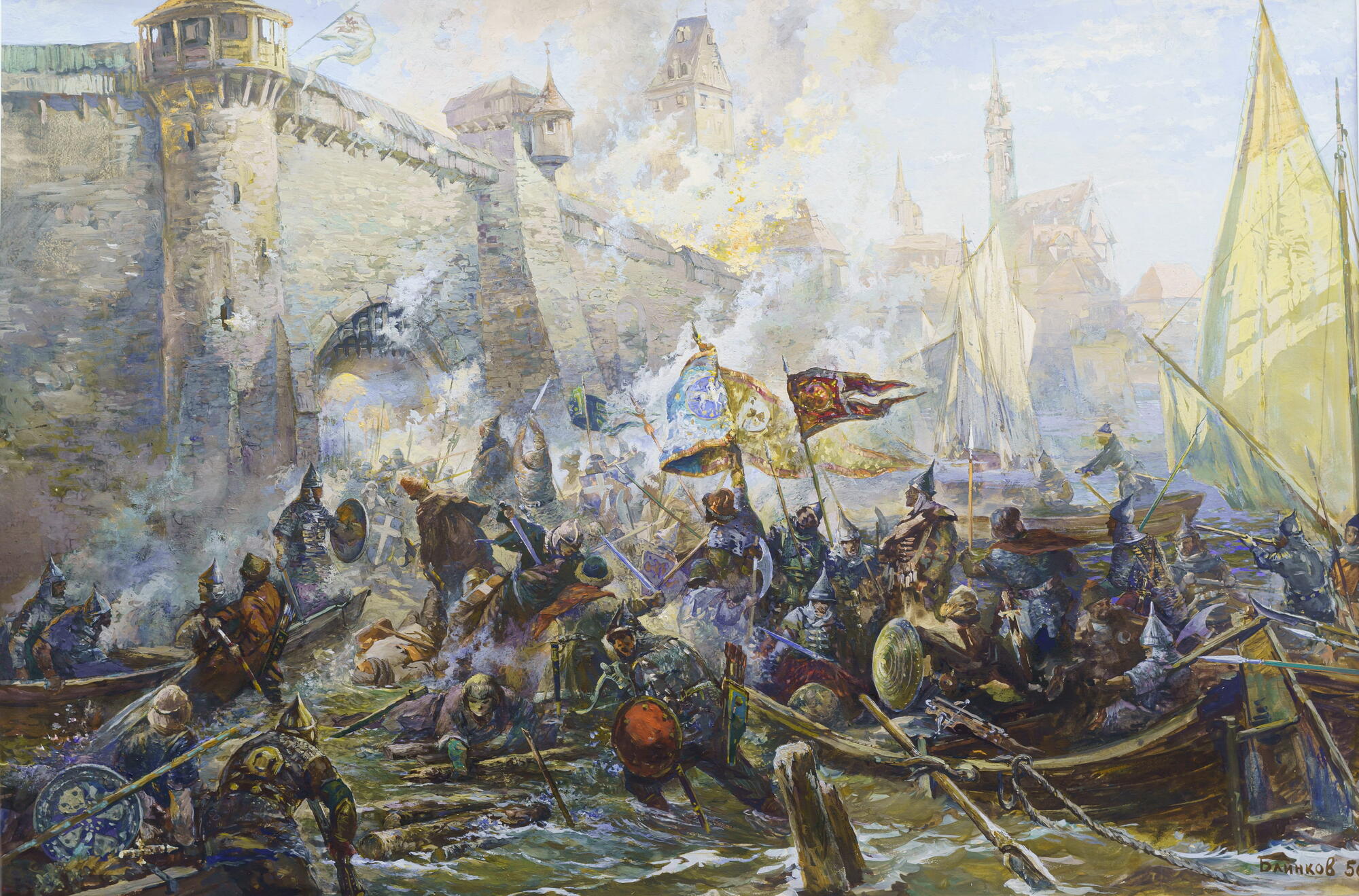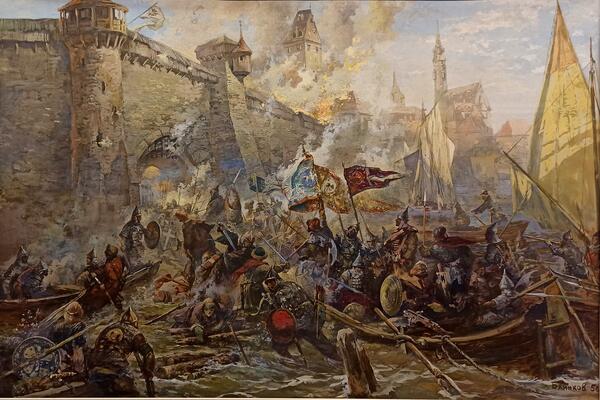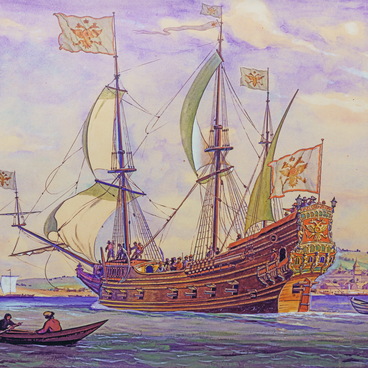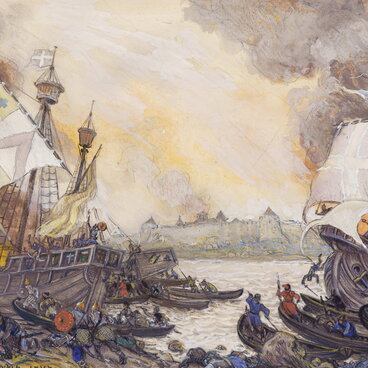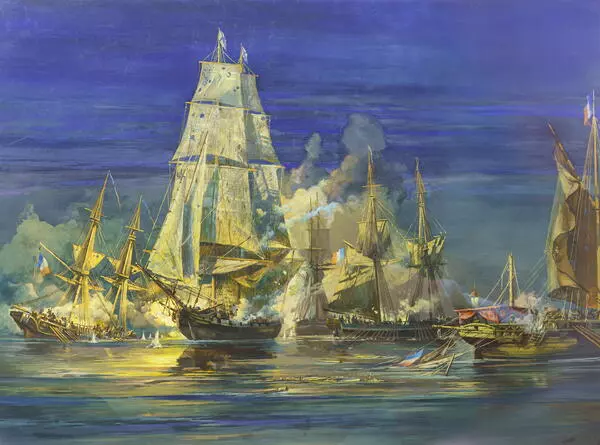In 1547, the 17-year-old Ivan IV declared himself tsar. This event marked an important step in the development of the tsarist autocracy in Russia, and for the country’s neighbors, it meant that Moscow would pursue a rather active foreign policy. During that period, the Russian tsar got new opportunities for expanding external relations. Ivan IV strove to revive oversea trade via the Baltic Sea.
The Livonian War of 1558–1583 broke out after Livonia had refused to pay a tribute for the Yuryev region (modern Tartu) which it owned based on the peace treaty concluded with the government of Ivan III in 1503, and to satisfy the demand of Moscow that Russian and foreign merchants should pass freely through Livonia.
In January 1558, a secret report came from Vilnius saying that Livonia had violated the peace treaty with Moscow by forming an alliance with Lithuania. Ivan IV commanded his army to invade Livonia. Having received an order not to waste time on besieging castles and towns, it moved rapidly from Pskov to Reval and Riga, wreaking havoc all over the country. Von Fürstenberg, the Livonian Order’s master, sent his brother to the Russian tsar to ask him for a cessation of hostilities. Ivan IV agreed, but the armistice was upset even before the arrival of Livonian envoys to Moscow.
In May 1558, a confrontation occurred between the forces of the Narva garrison and the Russian town of Ivangorod. On Good Friday, the Livonians on the fortification wall of Narva started firing at the Russian port of Ivangorod on the opposite bank. The Russians delivered retaliation fire. The voivodes Aleksey Basmanov and Daniil Adashev led their regiments to storm Narva. A big fire broke out in the city, and the Livonian guards left the wall to fight it. The Russian troops were few in number, but the enemy could not withstand their sudden and aggressive attack. Moscow warriors managed to cross the river quickly and break the gate. Understanding that resistance was futile, the Livonians surrendered the same night under the condition of being let to withdraw peacefully. Those who remained in Narva became Russian citizens. The overall results of the Livonian War for Russia were negative, and in 1581, Narva was captured by Swedish forces. However, in 1704, it was retaken by the troops of Peter the Great and remained part of the Russian Empire for a long time after.
The Livonian War of 1558–1583 broke out after Livonia had refused to pay a tribute for the Yuryev region (modern Tartu) which it owned based on the peace treaty concluded with the government of Ivan III in 1503, and to satisfy the demand of Moscow that Russian and foreign merchants should pass freely through Livonia.
In January 1558, a secret report came from Vilnius saying that Livonia had violated the peace treaty with Moscow by forming an alliance with Lithuania. Ivan IV commanded his army to invade Livonia. Having received an order not to waste time on besieging castles and towns, it moved rapidly from Pskov to Reval and Riga, wreaking havoc all over the country. Von Fürstenberg, the Livonian Order’s master, sent his brother to the Russian tsar to ask him for a cessation of hostilities. Ivan IV agreed, but the armistice was upset even before the arrival of Livonian envoys to Moscow.
In May 1558, a confrontation occurred between the forces of the Narva garrison and the Russian town of Ivangorod. On Good Friday, the Livonians on the fortification wall of Narva started firing at the Russian port of Ivangorod on the opposite bank. The Russians delivered retaliation fire. The voivodes Aleksey Basmanov and Daniil Adashev led their regiments to storm Narva. A big fire broke out in the city, and the Livonian guards left the wall to fight it. The Russian troops were few in number, but the enemy could not withstand their sudden and aggressive attack. Moscow warriors managed to cross the river quickly and break the gate. Understanding that resistance was futile, the Livonians surrendered the same night under the condition of being let to withdraw peacefully. Those who remained in Narva became Russian citizens. The overall results of the Livonian War for Russia were negative, and in 1581, Narva was captured by Swedish forces. However, in 1704, it was retaken by the troops of Peter the Great and remained part of the Russian Empire for a long time after.
